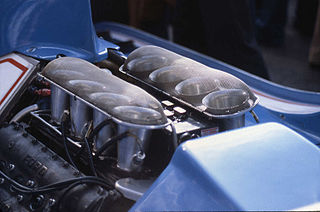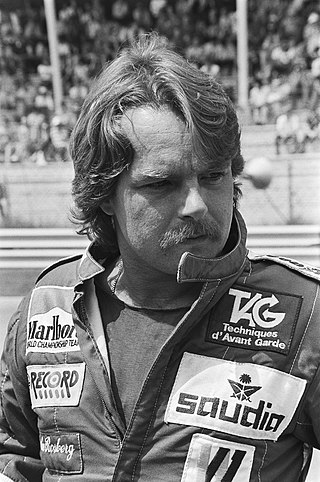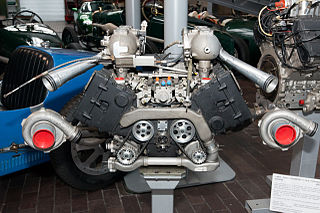
Cosworth is a British automotive engineering company founded in London in 1958, specialising in high-performance internal combustion engines, powertrain, and electronics for automobile racing (motorsport) and mainstream automotive industries. Cosworth is based in Northampton, England, with facilities in Cottenham, England, Silverstone, England, and Indianapolis, IN, US.

Keijo Erik "Keke" Rosberg is a Finnish former racing driver and motorsport executive, who competed in Formula One from 1978 to 1986. Rosberg won the Formula One World Drivers' Championship in 1982 with Williams, and won five Grands Prix across nine seasons.
The Tyrrell Racing Organisation was an auto racing team and Formula One constructor founded by Ken Tyrrell (1924–2001) which started racing in 1958 and started building its own cars in 1970. The team experienced its greatest success in the early 1970s, when it won three Drivers' Championships and one Constructors' Championship with Jackie Stewart. The team never reached such heights again, although it continued to win races through the 1970s and into the early 1980s, taking the final win for the Ford Cosworth DFV engine at the 1983 Detroit Grand Prix. The team was bought by British American Tobacco in 1997 and completed its final season as Tyrrell in the 1998 Formula One season. Tyrrell's legacy continues in Formula One as the Mercedes-AMG F1 team, who is Tyrrell's descendant through various sales and rebrandings via BAR, Honda, and Brawn GP.

The DFV is an internal combustion engine that was originally produced by Cosworth for Formula One motor racing. The name is an abbreviation of Double Four Valve, the engine being a V8 development of the earlier four-cylinder FVA, which had four valves per cylinder.

The 1985 German Grand Prix was a Formula One motor race held at Nürburgring on 4 August 1985. It was the ninth race of the 1985 Formula One season.

The 1984 FIA Formula One World Championship was the 38th season of Fédération Internationale de l'Automobile (FIA) Formula One motor racing. It featured the 1984 Formula One World Championship for Drivers and the 1984 Formula One World Championship for Manufacturers, both of which commenced on 25 March and ended on 21 October after sixteen races.

Judd is a brand of racing car engines built by Engine Developments Ltd., a company founded in 1971 by John Judd and Jack Brabham in Rugby, Warwickshire, England. Engine Developments was intended to build engines for Brabham's racing efforts, and became one of the first firms authorised by Cosworth to maintain and rebuild its DFV engines, but has since expanded into various areas of motorsport.
David Keith Duckworth was an English mechanical engineer. He is most famous for designing the Cosworth DFV engine, an engine that revolutionised the sport of Formula One.

The Brabham BT49 is a Formula One racing car designed by South African Gordon Murray for the British Brabham team. The BT49 competed in the 1979 to 1982 Formula One World Championships and was used by Brazilian driver Nelson Piquet to win his first World Championship in 1981.
Team Haas (USA) Ltd., sometimes called Beatrice Haas after its major sponsor, was an American Formula One team founded by Carl Haas in 1984 after an agreement with Beatrice Foods, a US consumer products conglomerate, which competed in the World Championship from 1985 to 1986. An agreement to use Ford engines for three seasons faltered after a change of management at Beatrice. The firing of Beatrice CEO Jim Dutt led to Beatrice withdrawing their funding of the project. The team was unable to continue in Formula One after the 1986 season. 1980 World Champion Alan Jones was coaxed out of retirement to drive the team's first car at the end of the 1985 season and on into 1986. Future prestigious designers Ross Brawn and Adrian Newey passed through the team.

The Renault RS01 was the first Formula One car to be powered by a turbocharged engine. It was also the first to use radial tyres, which were provided by Michelin. Designed by André de Cortanze and Jean-Pierre Jabouille, it first appeared at the 1977 British Grand Prix. The rules of F1 at the time permitted 3.0 litre naturally-aspirated engines, with a clause for a 1.5 litre supercharged or turbocharged engine. None of the teams had pursued this avenue, and stuck to Ford Cosworth DFV engines, whilst Ferrari, Matra and Alfa Romeo concentrated on developing Flat-12 engines for their cars, and their customer teams of Ligier and Brabham. Leading French car manufacturer Renault decided to develop a 1.5 litre turbocharged engine, and a car to accompany the powerplant.

The Tyrrell 012 is a Formula One racing car that was designed by Maurice Philippe for the Tyrrell team. It was introduced for the 1983 season, and was subsequently used in 1984 and the first few races of 1985.

Équipe Ligier is a motorsport team, best known for its Formula One team that operated from 1976 to 1996. The team was founded in 1968 by former French rugby union player Guy Ligier as a sports car manufacturer.

The Benetton B190 is a Formula One racing car designed by Rory Byrne in collaboration with Benetton's Technical Director, John Barnard, a designer with experience at racing companies McLaren and Ferrari and arguably the most successful Formula One designer of the 1980s with his cars winning 31 races since 1981. Geoff Goddard, chief designer at Cosworth was responsible for designing the car's engine, which was of exclusive use for Benetton. The B190 was raced by Benetton in all but the first two races of the 1990 Formula One season.

The Lola THL1 was a Formula One racing car designed by Neil Oatley for Team Haas (USA) Ltd. during four of the last five races of the 1985 Formula One season. The car used the 750 bhp, turbocharged Hart 415T Straight 4 engine.

The Lola THL2 was a Formula One racing car designed by Neil Oatley for FORCE and was used by Team Haas (USA) Ltd. during the 1986 Formula One season. Two of the FORCE aerodynamicists who worked on the car during its countless hours of Wind tunnel testing were a young Ross Brawn and Adrian Newey. The car debuted at the 1986 San Marino Grand Prix and was driven by 1980 World Drivers' Champion Alan Jones from Australia, and his new teammate Patrick Tambay of France.

The Tyrrell 015 was a Formula One car designed for Tyrrell Racing by Maurice Philippe for use in the 1986 season. The cars were powered by the turbocharged Renault EF15 V6 engine which was rated at 850 bhp in race trim. The 015 ran on Goodyear tyres and were driven by Martin Brundle in his third season with the team, and Philippe Streiff who joined from Ligier.

The Tyrrell 011 was a Formula One car designed by Maurice Philippe for the Tyrrell Racing Organisation.

The Ford Cosworth GBA is an extremely powerful turbocharged V6 racing engine, designed and developed by Cosworth, in partnership with Ford, for use in Formula One, from 1986 to 1987. The customer engine was raced by both Lola and Benetton. In the registration lists it appeared under the designations Ford TEC or Ford TEC-Turbo. The GBA was the only supercharged Formula 1 engine that Cosworth and Ford had in the so-called turbo era, and at the same time the last new development to be used before turbo engines were banned in 1989. The Cosworth GBA competed in 1986 and 1987. Only available to selected Formula 1 teams, it did not score a win in a Formula 1 World Championship round.

The Ford-Cosworth Indy V8 engine is a series of mechanically similar, turbocharged, 2.65-liter V-8 engines, designed and developed by Ford in partnership with Cosworth for use in American open-wheel racing. It was produced for over 30 years and was used in the United States Auto Club (USAC) Championship Car series, CART, and Champ Car World Series between 1976 and 2007. The DFX engine was the Indy car version of the highly successful 3-liter Ford-Cosworth DFV Formula One engine developed by former Lotus engineer Keith Duckworth and Colin Chapman backing from Ford for the Lotus 49 to campaign the 1967 season. This engine had 155 wins between 1967 and 1985 in F1. The DFX variant was initially developed for Indy car use by Parnelli Jones in 1976, with Cosworth soon taking over. This engine won the Indianapolis 500 ten consecutive years from 1978 to 1987, as well as winning all USAC and CART championships between 1977 and 1987. It powered 81 consecutive Indy car victories from 1981 to 1986, with 153 Indy car victories total.
















